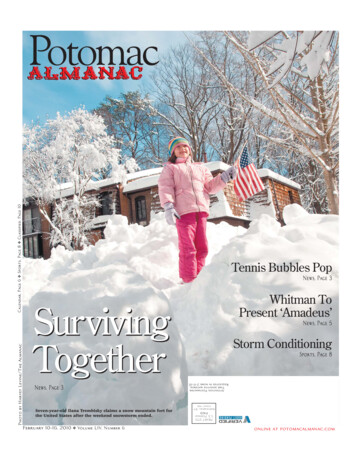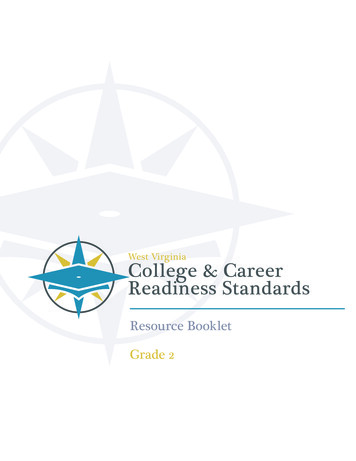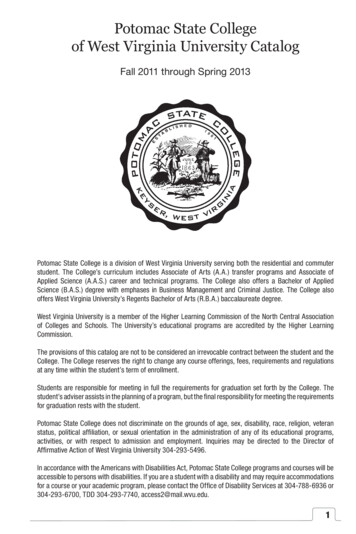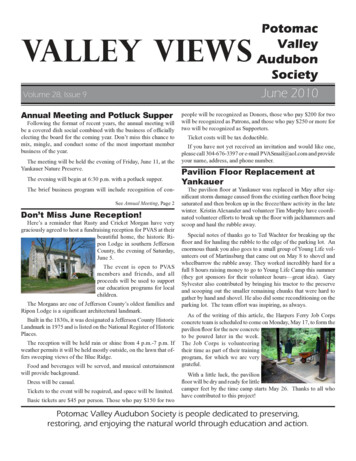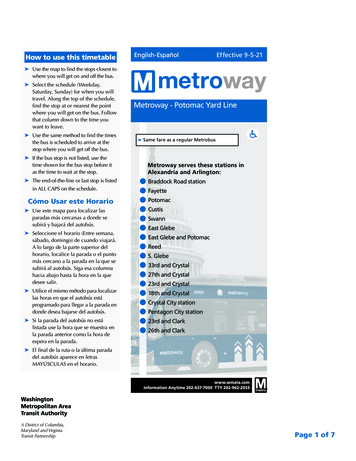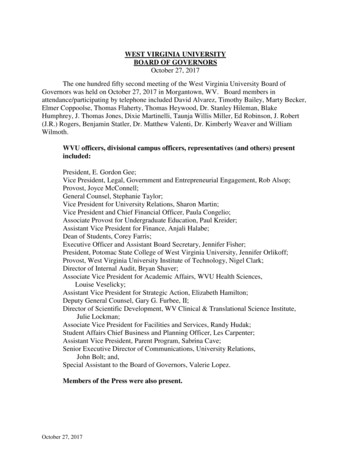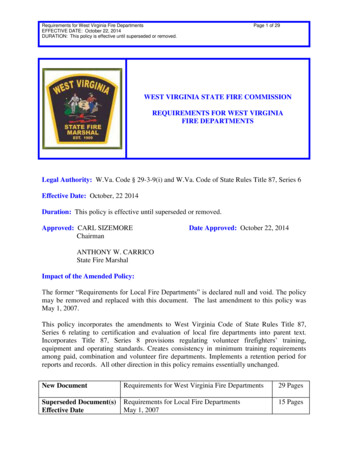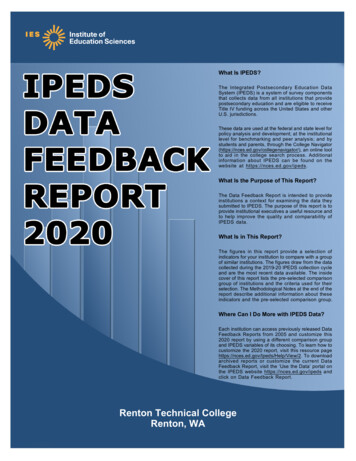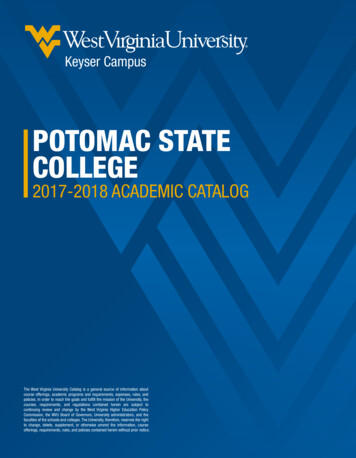
Transcription
Keyser CampusPOTOMAC STATECOLLEGE2017-2018 ACADEMIC CATALOGThe West Virginia University Catalog is a general source of information aboutcourse offerings, academic programs and requirements, expenses, rules, andpolicies. In order to reach the goals and fulfill the mission of the University, thecourses, requirements, and regulations contained herein are subject tocontinuing review and change by the West Virginia Higher Education PolicyCommission, the WVU Board of Governors, University administrators, and thefaculties of the schools and colleges. The University, therefore, reserves the rightto change, delete, supplement, or otherwise amend the information, courseofferings, requirements, rules, and policies contained herein without prior notice.
Table of ContentsPotomac State College of WVU . 3Academic Standards . 5Admissions . 11Advising, Enrollment & Grades . 17Degree Programs . 24Degree Regulations . 25FERPA . 26Financial Aid . 27Programs, Courses & Credits . 28Tuition, Fees & Residency . 32Applied Sciences . 35Agriculture and Environmental Education . 35Agriculture Technology . 37Animal Science . 39Business Administration, A.A. . 41Business Technology, A.A.S. . 43Business Management, B.A.S. . 44Computer Information Systems, B.A.S. . 46Criminal Justice Studies, A.A. . 48Criminal Justice Studies, A.A.S. . 50Criminal Justice, B.A.S. . 52Economics . 54Equine Production and Management . 56Forest Resource Management . 58General Agriculture . 60General Technical Studies . 62Horticulture . 64Information Technology . 66Pre-Veterinary Medicine . 68Recreation and Parks Management . 70Agriculture Resource Management . 73Sustainable Agriculture Entrepreneurship, A.A.S. . 75Sustainable Agriculture Entrepreneurship, B.A.S. . 77Wildlife Resources . 78Wood Industries . 81Liberal Arts . 84Communication Studies . 85Criminology . 87Early Childhood Education . 89
Elementary Education . 91English . 94General Studies . 96History . 98Journalism . 100Physical Education-Athletic Coaching Emphasis . 103Physical Education-Physical Education Teacher Emphasis . 105Physical Education-Sport Management Emphasis . 107Political Science . 110Psychology . 112Secondary Education . 114Sociology . 117Strategic Communications . 119Pre-Social Work . 121Regents Bachelor of Arts, R.B.A. . 124STEM . 127Aerospace Engineering . 127Biology . 129Biometric Systems . 131Chemistry . 133Civil Engineering . 136Computer Engineering . 138Electrical Engineering . 140Environmental Geoscience . 142Geology . 144Industrial Engineering . 146Mathematics . 148Mechanical Engineering . 150Nursing . 152Physics . 154Pre-Forensic and Investigative Science . 156Pre-Medical Lab Science . 158Pre-Nursing . 159Pre-Occupational Therapy . 161Pre-Pharmacy . 163Pre-Physical Therapy . 165Index . 168
West Virginia University3Potomac State College of WVUGeneral Information - WVU Potomac State CollegePotomac State College is a division of West Virginia University serving both the residential and commuter student. The College's curriculum includesAssociate of Arts (A.A.) transfer programs and Associate of Applied Science (A.A.S.) career and technical programs. The College also offers a Bachelorof Applied Science (B.A.S.) degree with emphases in Business Management and Criminal Justice. The College also offers West Virginia University'sRegents Bachelor of Arts (R.B.A.) baccalaureate degree.West Virginia University is a member of the Higher Learning Commission of the North Central Association of Colleges and Schools. The University'seducational programs are accredited by the Higher Learning Commission.The provisions of this catalog are not to be considered an irrevocable contract between the student and the College. The College reserves the right tochange any course offerings, fees, requirements and regulations at any time within the student's term of enrollment.Students are responsible for meeting in full the requirements for graduation set forth by the College. The student's adviser assists in the planning of aprogram, but the final responsibility for meeting the requirements for graduation rests with the student.The West Virgina University community is committed to creating and fostering a positive learning and working environment based on opencommunication, mutual respect, and inclusion. Inquiries may be directed to the Chief Diversity Officer of West Virginia University at 304-293-5600 ordiversity@mail.wvu.edu.In accordance with the Americans with Disabilities Act, Potomac State College programs and courses will be accessible to individuals with disabilities.If you are a student with a disability and may require accommodations for a course or your academic program, please contact the Office of AccessibilityServices at 304-788-7405 or 304-293-6700, access2@mail.wvu.eduHistory of WVU Potomac State CollegePotomac State College was created in 1901 as "Keyser Preparatory Branch of the West Virginia University" by an act of the legislature at the urgingof Mineral County Delegate Francis M. Reynolds, who was concerned about the quality of secondary education in the area. The bill provided anappropriation of 20,000 for buildings and empowered the governor to appoint a Board of Regents to govern the school.Colonel Thomas B. Davis, a local businessman, donated more than 16 acres of land as a site for the new school. That location, formerly Fort Fuller, wasa critical fortress in maintaining open roads leading to the South Branch and Shenandoah Valleys and in retaining Union control of the B&O Railroadduring the Civil War; the railroad was a major supply route for the Union Army. Two notable figures each served as commander of Fort Fuller, also calledFort Kelly; Major Lew Wallace, who later wrote Ben Hur, and Major Benjamin Harrison, future President of the United States. The land on which theschool is built came to be known as Fort Hill.When it opened its doors for classes in October 1902 as West Virginia Preparatory School, the institution consisted of a mult-purpose administrationbuilding fronted by a four-sided clock tower. The building housed offices, classrooms, the library, and gymnasium. Lloyd F. Friend was appointedprincipal and teacher and was joined by four other teachers.Potomac State continues today as a fully integrated division of West Virginia University enacted under a higher education reform measure, House Bill2224, passed by the 2003 state legislative session. The integration became official on July 1, 2005.College MissionTo provide access to a better life through a quality educational experience at an affordable cost.College PhilosophyWe believe our most important concern is the total development of the individual student. Therefore, we commit to providing a comprehensiveenvironment that invigorates the total individual: intellectually, creatively, culturally, physically, and socially. Potomac State College encourages studentsto: explore, discover and develop their special aptitudes and interests and to reach beyond their own perceived limitations; acquire the knowledge, critical thinking, problem solving, communication, teamwork, ethical, and social skills needed to support their immediateeducational goals, as well as life-long learning in a world characterized by change; experience leadership; nurture social responsibility and receptive attitudes compatible with citizenship within a global society.We support our faculty and staff in providing programs of study and instructional delivery that balance individual learning styles; didactic, cooperativeand experiential learning environments; and outcome-based standards for academic excellence.
4Potomac State College of WVUCommitment to AssessmentWest Virginia University conducts comprehensive and systematic assessment of student learning across all locations and delivery methods. Continuousimprovement of student learning is faculty-driven, conducted at the course, program, and institutional levels, and grounded in the work of theUndergraduate Council, the Graduate Council, and the University Assessment Council (UAC). UAC members from the WVU Morgantown Campus, theWest Virginia University Institute of Technology, and Potomac State College of WVU align assessment with the WVU mission and strategic plan andcollaborate with the Faculty Senate General Education Foundations (GEF) committee to conduct assessment of the GEF program. The Council works tostrengthen the effectiveness of assessment across all programs by: Facilitating faculty professional development in assessment. Providing consulting to departments to enhance their assessment planning and reporting. Compiling supporting documentation and evidence of the assessment work at WVU. Serving as an institutional-level clearinghouse for assessment best practices. Providing sustained attention on centralized, consistent, and systematic processes and policies across the University to reduce variability inassessment quality and engagement. Overseeing, reviewing, and commenting upon program review policies, processes, and reports.In this section: Governor of West Virginia (p. 4) West Virginia Higher Education Policy Commission (p. 4) West Virginia University Board of Governors (p. 4) West Virginia University Administration (p. 5) Potomac State College of WVU Administration (p. 5)Governor of West Virginia Jim Justice, GovernorWest Virginia Higher Education Policy Commission Paul L. Hill, Chancellor, Charleston Bruce Berry, Chair, Morgantown Jenny Allen, Vice Chair, Shepherdstown Kathy G. Eddy, Secretary, Parkersburg Michael J. Farrell, Huntington Kay H. Goodwin, Ex-Officio, Cabinet Secretary, Department of Education and the Arts, Charleston John Leon, Fairmont Michael J. Martirano, Ex-Officio, State Superintendent of Schools Andrew A. "Drew" Payne III, Charleston Clarence Pennington, Ex-Officio, Chair, WV Council for Community and Technical College Education, MartinsburgWest Virginia University Board of Governors Thomas V. Flaherty, Chair, Charleston William D. Wilmoth, Vice Chair, Wheeling Diane Lewis, Secretary, Morgantown David B. Alvarez, Bridgeport Gregory Babe, Pittsburgh, PA Ellen S. Cappellanti, Charleston James W. Dailey II, Martinsburg Robert K. Griffith, Faculty Representative, Morgantown J. Thomas Jones, Morgantown Raymond J. Lane, Menlo Park, CA Dixie Martinelli, Classified Staff Representative, Morgantown Julie Merow, Student Representative, Morgantown William O. Nutting, Wheeling Edward L. Robinson, Charleston
West Virginia University5 J. Robert "JR" Rogers, Hurricane Richard Turton, Faculty Representative, Morgantown Kimberly Weaver, Baltimore, MDThe WVU Board of Governors is the governing body of WVU. The Higher Education Policy Commission in West Virginia is responsible for developing,establishing, and overseeing the implementation of a public policy agenda for the state's four-year colleges and universities.West Virginia University is an Equal Opportunity/Affirmative Action Institution. The University does not discriminate on the basis of race, sex, age,disability, veteran status, religion, sexual orientation, color, or national origin in the administration of any of its educational programs or activities or withrespect to admission or employment. Further, faculty, staff, students, and applicants are protected from retaliation for filing complaints or assisting in aninvestigation under the University’s Equal Opportunity/Affirmative Action Plan. Inquiries regarding the University’s non-discrimination policy may be sentto the Office of Diversity, Equity, and Inclusion.West Virginia University Administration E. Gordon Gee, President Joyce McConnell, Provost and Vice President for Academic AffairsPotomac State College of WVU Administration Jennifer Orlikoff, Campus President Gregory Ochoa, Dean of Academic Affairs Phillip Douthitt, Associate Dean of Academic Affairs William Letrent, Dean of Students Harlan Shreve, Executive Director of Campus Operations Beth Little, Director of Enrollment Services Rene Trezise, Director of University Relations Carol Combs, Auxiliary Services Director Michael Simpson, Facilities DirectorAcademic StandardsAcademic Rights, Penalties, and AppealsThe policies described in this section are based on the West Virginia University (WVU) Board of Governors Policy 15, Student AcademicRights. This section expands the general policy to include procedures for undergraduate, graduate, and professional students at WVU(including the Potomac State and WVU Tech campuses).A student, by voluntarily accepting admission to West Virginia University (WVU) or enrolling in a class or course of study offered by WVU, acceptsthe academic requirements and criteria of the institution. Normally students may finish a program of study according to the requirements under whichthey were admitted to the program. However, requirements are subject to change at any time with reasonable notice provided to students. It is thestudent’s responsibility to fulfill coursework and degree or certificate requirements and to know and meet criteria for satisfactory academic progress andcompletion of the program. Students are expected to adhere to academic requirements and standards in all academic settings, such as classrooms,laboratories, and clinics, and during any activities that are part of academic requirements. Further, WVU students are citizens of a broader academiccommunity. As such, the University expects that every member of its academic community share its historic and traditional commitment to honesty,integrity, and the search for truth. To meet these standards, academic dishonesty is prohibited and is subject to academic penalties. Students who fail tomeet academic requirements or standards, or who engage in academic dishonesty, may be subject to one or more of the academic penalties describedin the Academic Penalties section.Any question of interpretation regarding student rights and responsibilities, academic penalties, or appeal processes for final grades, charges ofacademic dishonesty, or academic penalties shall be referred to the Provost and Vice President of Academic Affairs, the Vice President for HealthSciences, or the divisional campus President, as appropriate, for final determination.Any behaviors not academic in nature but related to student conduct should be referred to the Campus Student Code (see here (https://studentconduct.wvu.edu)) as stipulated in Board of Governors Policy 31 . Although academic penalties are imposed on students who engage in academic dishonesty according to proceduresdescribed below, findings of academic dishonesty may also be taken into consideration with respect to disciplinary penalties and procedures describedin the Campus Student Code.Academic RightsEach student at West Virginia University has the following academic rights (as well as others; see BOG Policy 15 (http://bog.wvu.edu/policies)):
6Potomac State College of WVU1. Right to have his/her performance evaluated solely upon performance as measured against academic standards. The student shall not be evaluatedprejudicially, capriciously, or arbitrarily. The student shall not be graded, nor shall his/her performance be evaluated, on the basis of his or herrace, color, national origin, ancestry, age, physical or mental disability, marital or family status, pregnancy, veteran status, service
General Information - WVU Potomac State College Potomac State College is a division of West Virginia University serving both the residential and commuter student. The College's curriculum includes Associate of Arts (A.A.) transfer programs and Associate of Applied Science (A.A.S.) career and technical programs. The College also offers a Bachelor
